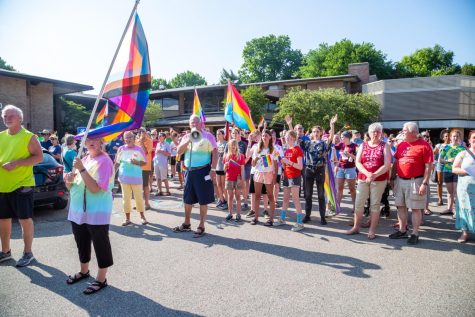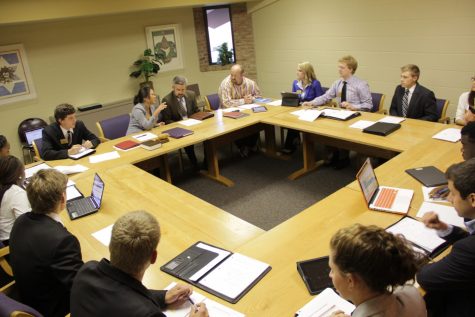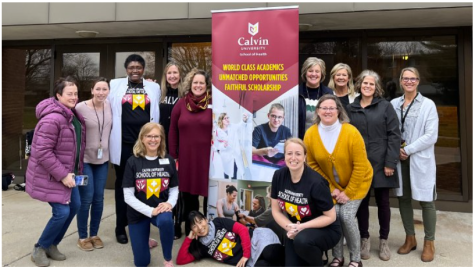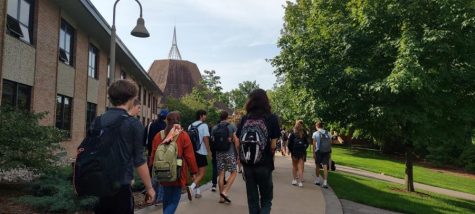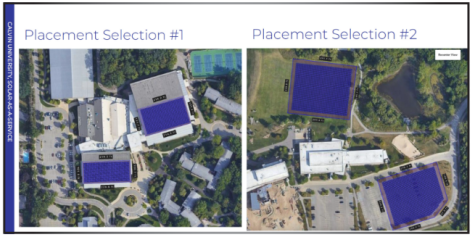Ready for Life expands and improves inclusive experiences on campus

Eric Carter’s graphic that Strater and her colleagues consider when making decisions for RFL.
Calvin’s Ready for Life Academy — a program that gives students with intellectual disabilities a college experience while preparing them for independent living — has implemented changes to their on-campus residential opportunities, which were first offered last year thanks to a five-year grant for inclusive programming.
The grant has not only made inclusive living support achievable for Calvin, but also changed the way in which the university partners with the Ready for Life organization, from staffing to certification requirements to meal plans. Today, “all of those structural things are just more accessible,” Kate Strater, professor and coordinator for the Ready for Life Academy program at Calvin, said.
History
Ready for Life is a non-profit organization that provides experiences in higher education for students with intellectual disabilities; according to Strater, RFL first partnered with Calvin in 2007. At the program’s launch, the RFL students largely were “operating in their own group,” said Strater, despite attending classes on Calvin’s campus.
Emily Perton, executive director of the Ready for Life non-profit — which also runs two other campuses and a day program — and an adjunct professor at Calvin, told Chimes partnering with Calvin was a challenge at first, because the RFL staff weren’t Calvin staff and didn’t know the “ins and outs” of the university.
In the last few years, however, Calvin has been moving toward a more inclusive vision, Strater said, and possibilities for the implementation of this vision opened up when Calvin received the Transition and Postsecondary Education for Students with Intellectual Disabilities grant from the U.S. Department of Education in 2020.
“The whole purpose of the grant is to find ways to be more inclusive,” Strater said. In writing the grant, she had to outline specific goals towards which the university is to move. “Some of the things that are in there are things like inclusive housing [and] offering a meaningful credential,” she said.
Today, RFL students can choose one of two Calvin certifications to work towards: Life and Career Studies or Comprehensive Postsecondary Education; within the latter, students can choose a concentration from a variety of course paths, including arts and music, creation care, communications and commerce, and education. Two classes have successfully graduated with certificates, so far.
In addition to the difference in certification requirements, Perton told Chimes, “that grant really opened up doors and opportunities for students here on Calvin’s campus specifically by providing some staff here on Calvin’s campus to make connections.”
Michelle Terrill was hired by Calvin to work exclusively with the RFL program. A large part of her role has been overseeing RFL students’ transition into on-campus living.
Housing changes
Over the last year, Strater said the RFL program realized Terrill’s role was too much for one person; this year they hired a graduate assistant exclusively to support RFL students living in residence halls.
A dedicated GA for RFL students may help to ease demands on resident assistants, too. Last year, some RAs in Boer-Bennik experienced an outsized workload; Perton told Chimes that RFL students often tended to go to the person they liked the most when there was a problem, rather than the person who was on call.
Perton hopes the consistency of the GA — “We’re hoping that with one GA that they will all go to her” — combined with the GA’s age and life experience, will create a more positive situation for RFL students and their dorm communities this year. “We think it will be really beneficial to have someone who has a little bit more life experience to pour into the students when there are struggles,” Perton said.
In addition to resident assistants and the new graduate assistant, the Ready for Life program also employs students in inclusive living support roles. Rachit Kharel, a sophomore studying elementary education, is in his second year as an inclusive living support staff member for RFL.
He told Chimes his job is complicated. “So our role is like, we’re their friends, but at the same time we are the staff and the mandatory reporter. And at the same time we are a person in authority whom they will look up to, so having all these mixed-up feelings is really hard for us to identify who we are for them,” Kharel said.
He builds relationships with RFL students through daily check-ins and said getting to build deep relationships is one of the things he likes about the program.
Kharel works to open dialogue between degree-seeking students and RFL students when the latter do not feel like they are welcome in particular situations. However, he says that “[degree seeking] residents are always willing to like, lean in,” as are the RFL students, so most conflict is usually resolved well.
Perton and Kharel told Chimes that last year when all the RFL students lived together on the same side of the floor, they maintained contact with each other, but tended not to seek out connection with degree-seeking students on the floor or elsewhere in the dorm.
“We decided that based on what we saw last year it would be great to separate them a bit more,” Perton said. RFL students now live on all floors of Boer-Bennink.
Student experiences
Seniors Jada Thomas and Jonathon “JonJon” Conflitti, have both had positive experiences in the dorms. “I like doing dorms because it’s a good community and … I like being with my friends, and being on a team,” Thomas said. Both students lived off campus for the first two years of their college experience; they said living on campus has been much better for them.
First-year student Josh Talbot has already been enjoying the opportunities inclusive on-campus living has afforded him. “Dorm retreat was so fun!” he said.
RFL students are involved in many campus events, too; Conflitti participates in gospel choir and dance guild, and enjoys attending campus events.
Kelesy Jordan, a senior living on an upperclassman floor in Bolt-Heyns-Timmer and the only RFL student not living in Boer-Bennink, is involved with the theater company and dance guild. She also does “a lot of fun stuff on campus,” where she has “[made] a lot of memories the past four years.”
Increasingly, RFL students are also participating on campus academically. “Prior to the grant … our percentage of inclusive classes versus classes where students were learning things like independent living and personal finance and some of those independent living skills, was probably more like 30% inclusive and around 70% other courses and other experiences,” Strater said. Last year, those percentages were closer to 50/50.
Regarding her academic career, Thomas told Chimes, “Ready for Life is a good thing for us, because we learn how to take classes, how to be on time — we talk about how to get jobs one day.” She also mentioned money management.
Talbot told Chimes he’s been hard at work when it comes to academics, “doing college things like homework.”
Belonging
“We are so thankful for this partnership with Calvin. We are impressed and consistently blown away with the way the community as a whole has seen this as an opportunity for growth and diversity and just that idea of creating a sense of belonging for everybody on campus,” Perton told Chimes, but she and Strater said there is always more work to do.
For Strater, inclusion is a many-faceted process that includes being loved, invited, present, supported and accepted. A desire to perpetuate that kind of belonging for all students, according to Strater, “shapes every decision” in the RFL program.
The goal is for the RFL students “to be a part of Calvin to a degree that we would be missed if we weren’t here,” said Strater. Ultimately, Strater hopes that inclusion will be normal, to the point where Calvin can say: “This is just how we are here.”






